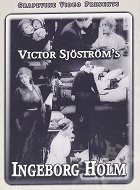Director:
Victor SjöströmCámara:
Henrik JaenzonStreaming (1)
Sinopsis(1)
In 1913 Victor Sjöström's film Ingeborg Holm premiered. The portrayal of a widow who lost her mind when her children were taken from her was the first Swedish film to lead to actual debate. The day after the premiere, "Dagens Nyheter" ranted about "Poor Relief Criticized at the Cinema." A heated debate followed: was Sjöström's film an irrelevant sensationalist piece or a realistic portrait? When the Swedish Poor Relief Act was amended in 1918 many thought that it was because of Margaret Day. Aside from giving rise to debate, Margaret Day is one of Swedish cinema's first masterpieces. The screening will be accompanied by the Matti Bye Ensemble and is presented in cooperation with Cinemateket and Lova Hagerfors from the Swedish Film Institute. (Göteborg Film Festival)
(más)Reseñas (1)
A decent drama that would find its place even today in women's films. The story of Ingeborg Holm, who starts out as a contented housewife in a sober household, reaches both a peak of happiness and a fatal slump in a very short period of time, a mirroring of modern times in its horrific nature. The quality of the acting and the escalation of existential tension work perfectly. Perhaps only the epilogue is a somewhat futile way out of the whole situation. Ingeborg Holm is considered to be the first classic work of Swedish cinema and a key project for Victor Sjöström's future direction. It’s an adaptation of Nils Krok's 1906 play based on a true story. The film also influenced a change in legislation.
()
